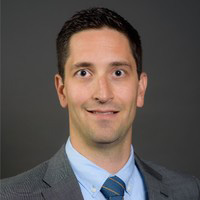Alum Spotlight: Weston Sramek
 Weston Sramek, originally from Colorado Springs, CO, is currently a Radiological Controls Engineering Supervisor at General Dynamics Electric Boat. He got his Mechanical Engineering degree from Colorado School of Mines before coming to Northwestern University to complete his MEM degree. Weston has two sons, Wilson (2.5 years) and Maxwell (6 months) and loves being a dad. We caught up with him recently to ask him to reflect on his time at MEM and the impact it has had on him since.
Weston Sramek, originally from Colorado Springs, CO, is currently a Radiological Controls Engineering Supervisor at General Dynamics Electric Boat. He got his Mechanical Engineering degree from Colorado School of Mines before coming to Northwestern University to complete his MEM degree. Weston has two sons, Wilson (2.5 years) and Maxwell (6 months) and loves being a dad. We caught up with him recently to ask him to reflect on his time at MEM and the impact it has had on him since.
Can you give a short description of your role and job responsibility?
I currently work for Electric Boat in Groton, CT. Electric Boat’s primary business is the design, construction, and maintenance of nuclear-powered submarines. I work in the Radiological Controls department where our main assignment is to ensure that Electric Boat is delivering safe, cost-effective nuclear servicing capability to the US Navy. My specific role involves working with a group of engineers that are responsible for all radioactive material shipments to and from Electric Boat. I am also responsible for the development and initial qualification of all new engineers that enter our department.
What’s your favorite class or teacher in MEM, Why?:
The two teachers that stood out were Gail Berger and Donald McNeeley.
I use the skills I learned in Professor Berger’s classes, Leadership and Organizational Behavior and Negotiations for Engineers, on a daily basis. Whether it’s helping my team interact with other organizations or working to progress my own projects, the foundations she taught have time and again been invaluable.
Professor McNeeley and his Strategic Management course was unlike any class I have ever taken. I felt that each lecture was like going to the movies. He was captivating, the material informative and the way he encouraged me to think has helped me understand the broader picture of business and industry. I still get excited every time I see one of his columns show up in The Wholesaler.
How has your MEM experience contributed to your career path and your current job role?
I use the skills and tools I learned in the MEM program every day. The degree helped me differentiate myself in a new geographical market and the skills have allowed me to earn my place with colleagues that have been in their positions for twenty or thirty years.
What new job, position, project or responsibility were you able to secure that you believe can be attributed to completing the program?
Electric Boat celebrated its 120th anniversary this year. In a company that is established, some areas perform well, but there are others that have been patchworked and may not meet the current business needs. MEM allows me to help expose and work on the latter to ensure we are well-positioned for the future. Specifically, I have spent a great deal of time working on how we allocate and budget time for our engineers as well as how we prosecute and document significant issues in our work.
What new skills did you gain and how did this impact your career or professional life?
I feel that the MEM program allowed me to pack fifteen years of work experience into one curriculum. This has allowed me to more easily understand how my engineering group fits into the larger company and effectively communicate to other organizations when I see a problem.
What unique aspect of the program did you experience that you felt was unique to Northwestern’s program?
Classmates that have practical experience. They have either gone through or are going through most of the problems that I encountered and being able to discuss real-life situations in the context of a class is something that is unique and valuable to Northwestern’s MEM program.
How did the program structure help to make earning this degree a possibility for you?
If not for the flexibility of the program I most likely wouldn’t have been able to get my Master’s degree. I started the program planning on being part-time and taking one or two classes a quarter but when plans changed and I needed to finish sooner than I thought I was able to complete the program in just a year and a half while still working.
Word of advice to future students:
Have fun. Life is short and there is so much life outside of work and your career. Figure out what brings you joy and who you want to be, then use the skills you will learn to seek and find opportunities that allow you to contribute to projects you are passionate about. Building relationships and helping others achieve their goals is one of the best jobs in the world and I would encourage anyone to find ways to help others.

